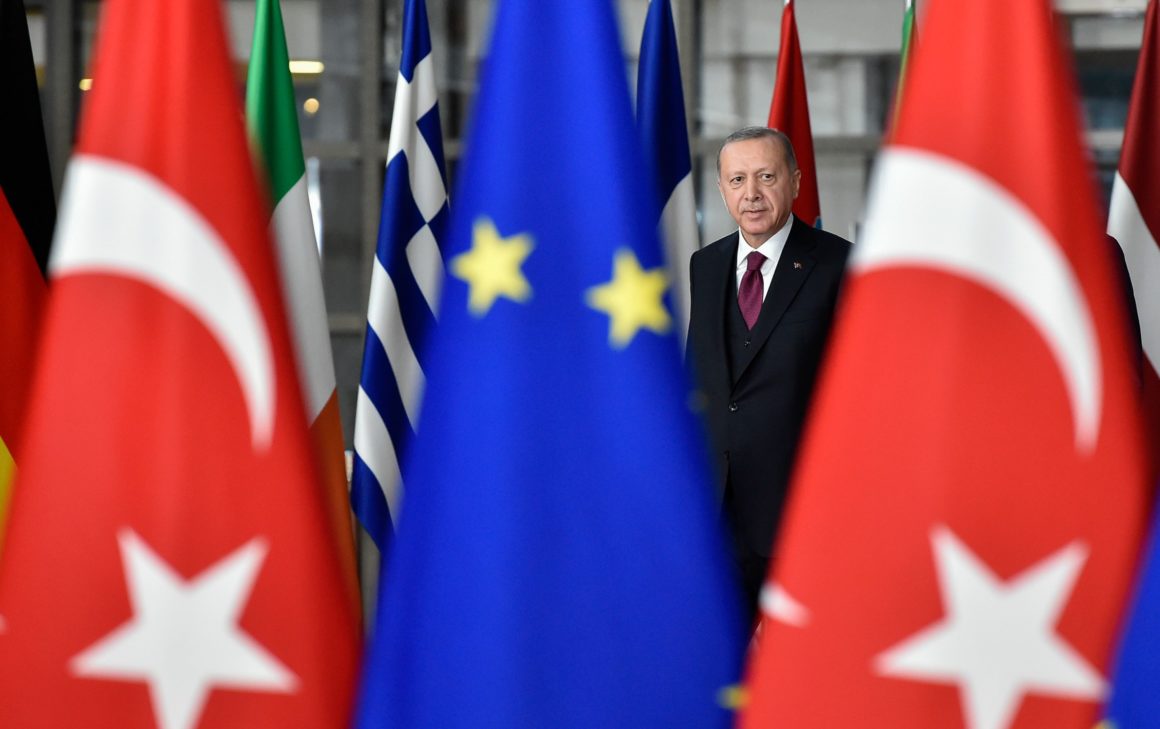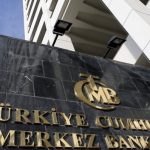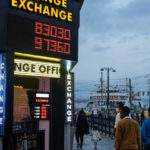The economy in crisis, approval ratings at an all-time low, rising tension within government ranks: Turkish President Recep Tayyip Erdogan is currently under massive pressure. Nevertheless, the USA and the EU seem to be coming to his rescue.
Fittingly for the AKP congress, the cold weather returned to Ankara last week. It was snowing nonstop as hundreds of people from across the country gathered outside the convention centre to get a front row seat the next morning. For them, two days in Ankara means two days of partying and free food. And that’s worth queuing for in times of a pandemic and severe economic crisis.
According to Erdogan, his AKP party has 13.5 million members. “The world has not seen a party of this size,” he boasted at the party convention. On social media, the figure was immediately put into perspective with some people posting that the AKP was a party for opportunists and that about 99% of its members had joined just to benefit from the traditional AKP nepotism and to get a job or something to eat.
Unlike in the past, however, the images of cheering crowds inside and outside the convention centre where the AKP party congress was taking place could no longer belie the fact that the Turkish people are frustrated with their president. Even people who voted for Erdogan years ago – including world-famous writers who have since been imprisoned and women’s rights activists – are now railing and protesting against him.
In recent times, Erdogan has given them ample reason to do so. A few days before the party congress, events in Turkey came to a head. It began with the launching of proceedings to ban the second largest opposition party in the country, the predominantly Kurdish HDP. Then, in a move with a dubious legal basis, Erdogan decreed Turkey’s withdrawal from the Istanbul Convention, a Council of Europe agreement to protect women in particular against violence. Almost concurrently, he dismissed the head of the central bank, Naci Agbal, causing the lira to crash yet again.
Erdogan then wrested control of Gezi Park in Istanbul from the Istanbul city administration and transferred it to a foundation to which he has close ties. Eight years ago, the government slated the park for destruction, prompting millions of people worldwide to take to the streets in protest. He also secured state guarantees for the construction of the Istanbul Canal, an exorbitantly expensive project that seeks to connect the Black Sea and the Sea of Marmara.
“We can do whatever we want”
A few days before, US President Joe Biden had urged the EU to refrain from imposing sanctions on Turkey. Following Washington’s lead as usual, Brussels went one step further at the EU–Turkey talks a few days ago: “Given Turkey’s more constructive attitude recently, we are ready to engage in areas of joint interest such as migration & customs,” tweeted EU Commission President Ursula von der Leyen after the meeting. At least for the moment, there was no more talk of first requiring Turkey to amend its anti-terrorism laws.
Even the launching of proceedings to ban the HDP – whose supporters are now being lumped together as allegedly supporting the PKK, a listed terrorist organisation – which has led to waves of arrests recently, prompted at most only a few isolated admonishments from within the EU. Germany, for example, reacted by saying that the HDP would do better to distance itself from the PKK.
Turkish Interior Minister Süleyman Soylu – one of the most powerful men in the government – recently summed up Turkey’s relationship with the West by saying: “We can do whatever we want.”
On 17 March, proceedings were launched to get the Constitutional Court to ban the HDP. The government accuses the HDP, a pro-Kurdish party, of supporting the PKK, a listed terrorist organisation. According to author of “Erdogan’s Empire”, Soner Cagaptay, demonising the HDP would help Erdogan and his party by breaking up the opposition bloc and making it harder for the opposition to win elections
Few decision-makers, many posts
Nevertheless, the USA in particular is no friend of the Turkish government. Biden has not spoken to Erdogan once on the phone since being elected president. Moreover, tens of thousands of US troops as well as helicopters and drones are currently stationed in Greece near the Turkish border.
“The USA naturally did not inform us about this,” says Deputy Foreign Minister Faruk Kaymakci of Turkey. The AKP foreign policy expert does not seem to understand the reason for the massive US presence. “To be honest, it’s not my jurisdiction,” he laughs.
His statement is exemplary of a phenomenon typical of the Erdogan government: there are many political posts – the AKP executive was recently increased from 50 to 75 members – but hardly any politicians who can actually make any decisions. Erdogan is, after all, the bottleneck of Turkish realpolitik through which every decision must pass.
Historically poor approval ratings
What looks like total power might actually spell his undoing, however, says the author of “Erdogan’s Empire”, Soner Cagaptay: “While he has been sitting at the zenith of his political power since the introduction of the presidential system, the head of the party, state and army, he has also been dangerously weakened by that system.” Before this, there were diverse opposition forces. Now there is only the decision either for or against Erdogan.
And as of late, people are deciding against him. Recent polls show that the party of the politician who once made a career as a man of the people now has an approval rating of only around 30 per cent. Together with the maximum 8 per cent for his right-wing nationalist alliance partner MHP, that amounts to 38 per cent. At least 51 per cent is needed to stay in power.
This is the worst approval rating since Erdogan took power. Cornered, he is now lashing out. The withdrawal from the Istanbul Convention and the change of plans regarding Gezi Park and the Istanbul Canal can clearly be seen as gifts to Erdogan’s core constituency: conservative Muslims and the construction industry.
“Demonising the HDP works to break up the opposition bloc,” Cagaptay says in his analysis. “When elections are held, Erdogan will only have a chance if the opposition parties run against the combination of AKP and MHP in two electoral alliances.”
Failed military operation
Rumours of regime change through a new cabinet are providing some distraction and reason to hope for a breath of fresh air in Ankara. There is, for example, talk of the return of Erdogan’s son-in-law Berat Albayrak to a government post. His closeness to the new central bank chief shows that even without an official post, Albayrak would still be active in the background as a kind of shadow minister.
But it is not only the government that seems particularly uncoordinated and fragmented at the moment, so too does its relationship with the state, especially the military. The best example is the failed attempt to rescue 13 high-ranking Turkish hostages held by the PKK. In early March, Turkey sent tanks and combat planes into northern Iraq – a move that Erdogan had announced a short time previously.
But if a military operation is to be successful, it is not normal to announce it in advance, thus giving the enemy time to prepare. And hostages are not usually freed by tanks in full public view but by Special Forces in clandestine raids.
Gendarmerie forces are also said to have been on the scene. They are under the command of Interior Minister Soylu and are not normally active abroad. All of this points to an operation that was, at the very least, ill-conceived. Moreover, the news of the discovery of the 13 bodies made for bad press back home.
The West needs Turkey
Nevertheless, such failed cooperation between state agencies and the government cannot yet be taken as an indication that the military is pushing for regime change, because the military would not interfere in political affairs without the support of the USA – and Washington is at present adopting a supportive attitude towards Ankara.
The West is thus busy playing its own game: Erdogan is being allowed to win at home so that other goals can be pursued via Turkey. Washington needs Turkey to step up its influence in Syria and Libya. Moreover, the USA and Europe most likely want to prevent any further rapprochement between Ankara and Beijing or Moscow.
In short, the reason for the change in course can thus be found in the Western nations’ own ambitions in the region. The Erdogan government can be used as a means to an end as long as it is facing domestic political difficulties and poor polling results.
What might still save Erdogan would be a return to the parliamentary system, or an amendment to the constitution to the effect that a simple majority is sufficient for government. At the party congress, Erdogan promised that a constitutional amendment would be forthcoming by 2022. But he didn’t explain what the reform would entail.
Instead, he continued to pretend that he was not only still in power, but still had undivided support. Like a would-be dictator, Erdogan had himself elected chairman with only three spoiled ballots out of a total of almost 1,500 votes. And he committed his supporters to Turkey’s entry into the 21st century, something that has in fact been going on for more than two decades. “One state, one flag, one country, one government” he shouted, raising his hand in a salute used by the Muslim Brotherhood and its supporters. The party followed suit, albeit reluctantly.
By: Marion Sendker
© Qantara.de 2021
Translated from the German by Jennifer Taylor



